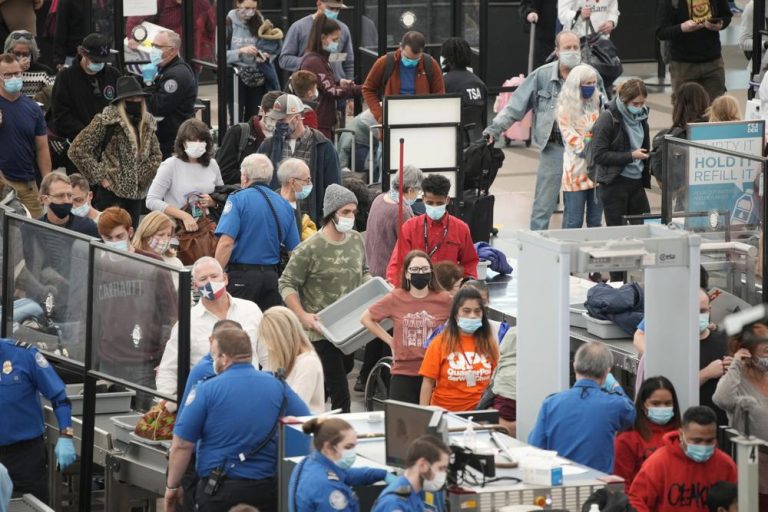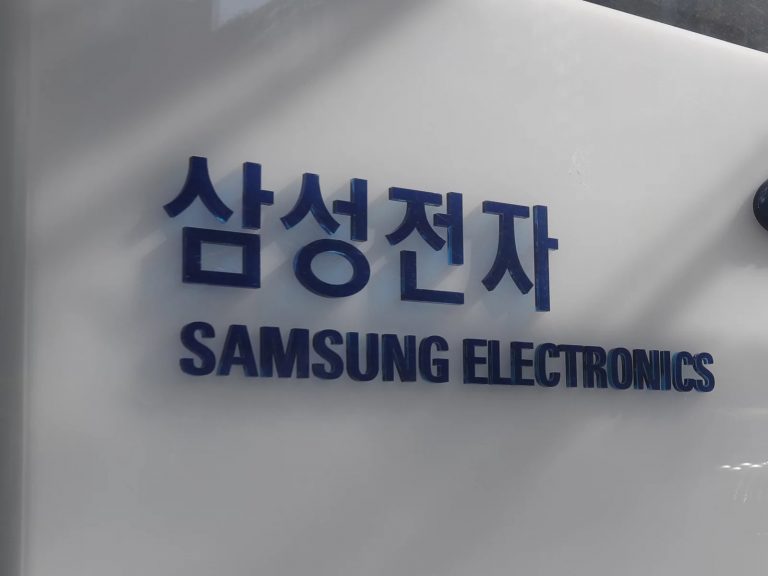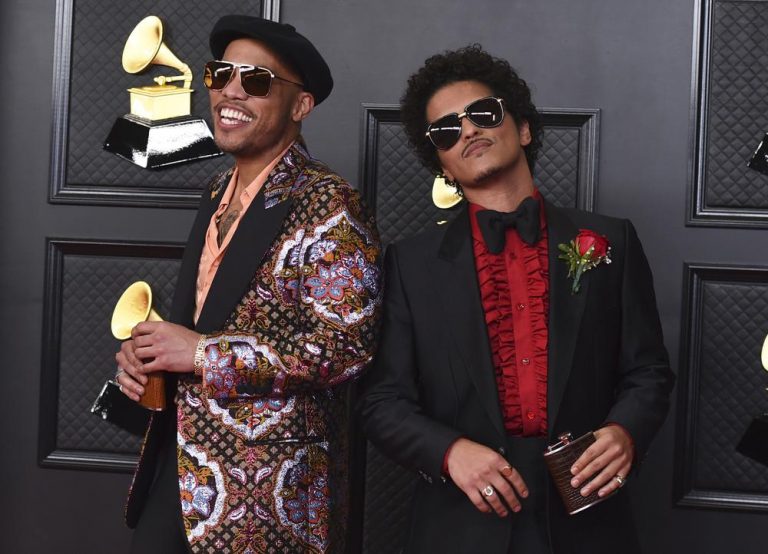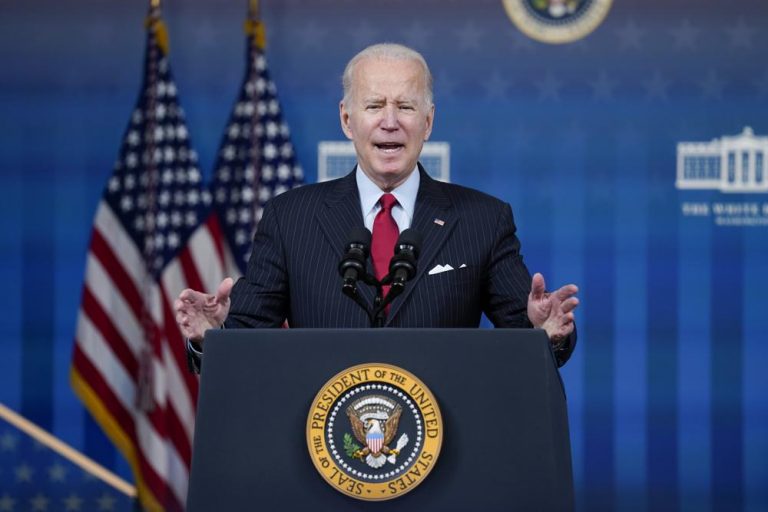According to AP, A list of nominees in the top categories at the 64th annual Grammy Awards, announced Tuesday by The Recording Academy.
— Album of the year: “We Are,” Jon Batiste; “Love For Sale,” Tony Bennett and Lady Gaga; “Justice (Triple Chucks Deluxe),” Justin Bieber; “Planet Her (Deluxe Edition),” Doja Cat; “Happier Than Ever,” Billie Eilish; “Back of My Mind,” H.E.R.; “MONTERO,” Lil Nas X; “Sour,” Olivia Rodrigo; “Evermore,” Taylor Swift; “Donda,” Kanye West.
— Record of the year: “I Still Have Faith in You,” ABBA; “I Get a Kick Out of You,” Tony Bennett and Lady Gaga; “Peaches,” Justin Bieber featuring Daniel Caesar and Giveon; “Right on Time,” Brandi Carlile; “Kiss Me More,” Doja Cat featuring SZA; “Happier Than Ever,” Billie Eilish; “MONTERO (Call Me By Your Name),” Lil Nas X; “Drivers License,” Olivia Rodrigo; “Leave the Door Open,” Silk Sonic.
— Song of the year (songwriter’s award): “Bad Habits,” Johnny McDaid and Ed Sheeran; “A Beautiful Noise,” Ruby Amanfu, Brandi Carlile, Brandy Clark, Alicia Keys, Hillary Lindsey, Lori McKenna, Linda Perry and Hailey Whitters; “Drivers License,” Daniel Nigro and Olivia Rodrigo; “Fight For You,” Dernst Emile II, H.E.R. and Tiara Thomas; “Happier Than Ever,” Billie Eilish O’Connell and Finneas O’Connell; “Kiss Me More,” Rogét Chahayed, Amala Zandile Dlamini, Lukasz Gottwald, Carter Lang, Gerard A. Powell II, Solána Rowe and David Sprecher; “Leave The Door Open,” Brandon Anderson, Christopher Brody Brown, Dernst Emile II and Bruno Mars; “MONTERO (Call Me By Your Name),” Denzel Baptiste, David Biral, Omer Fedi, Montero Hill and Roy Lenzo; “Peaches,” Louis Bell, Justin Bieber, Giveon Dezmann Evans, Bernard Harvey, Felisha “Fury” King, Matthew Sean Leon, Luis Manuel Martinez Jr., Aaron Simmonds, Ashton Simmonds, Andrew Wotman and Keavan Yazdani; “Right On Time,” Brandi Carlile, Dave Cobb, Phil Hanseroth and Tim Hanseroth.
— Best new artist: Arooj Aftab; Jimmie Allen; Baby Keem; Finneas; Glass Animals; Japanese Breakfast; The Kid Laroi; Arlo Parks; Olivia Rodrigo; Saweetie.
— Best pop solo performance: “Anyone,” Justin Bieber; “Right on Time,” Brandi Carlile; “Happier Than Ever,” Billie Eilish; “Positions,” Ariana Grande; “Drivers License,” Olivia Rodrigo.
— Best pop duo/group performance: “I Get a Kick Out of You,” Tony Bennett and Lady Gaga; “Lonely,” Justin Bieber and benny blanco; “Butter,” BTS; “Higher Power,” Coldplay; “Kiss Me More,” Doja Cat featuring SZA.
— Best pop vocal album: “Justice (Triple Chucks Deluxe),” Justin Bieber; “Planet Her (Deluxe), Doja Cat; “Happier Than Ever,” Billie Eilish; “Positions,” Ariana Grande; “Sour,” Olivia Rodrigo.
— Best traditional pop vocal album: “Love for Sale,” Tony Bennett and Lady Gaga; “’Til We Meet Again (Live),” Norah Jones; “A Tori Kelly Christmas,” Tori Kelly; “Ledisi Sings Nina,” Ledisi; “That’s Life,” Willie Nelson; “A Holly Dolly Christmas,” Dolly Parton.
— Best dance/electronic album: “Subconsciously,” Black Coffee; “Fallen Embers,” Illenium; “Music is the Weapon (Reloaded), Major Lazer; “Shockwave,” Marshmello; “Free Love,” Sylvan Esso; “Judgement,” Ten City.
— Best rock album: “Power Up,” AC/DC; “Capitol Cuts – Live from Studio A,” Black Pumas; “No One Sings Like You Anymore Vol. 1,” Chris Cornell; “Medicine at Midnight,” Foo Fighters; “McCartney III,” Paul McCartney.
— Best alternative music album: “Shore,” Fleet Foxes; “If I Can’t Have Love, I Want Power,” Halsey; “Jubilee,” Japanese Breakfast; “Collapsed In Sunbeams,” Arlo Parks; “Daddy’s Home,” St. Vincent.
— Best progressive R&B album: “New Light,” Eric Bellinger; “Something to Say,” Cory Henry; “Mood Valiant,” Hiatus Kaiyote; “Table for Two,” Lucky Daye; “Dinner Party: Dessert,” Terrace Martin, Robert Glasper, 9th Wonder and Kamasi Washington; “Studying Abroad: Extended Stay,” Masego.
— Best R&B album: “Temporary Highs in Violet Skies,” Snoh Aalegra; “We Are,” Jon Batiste; “Gold-Diggers Sound,” Leon Bridges; “Back of My Mind,” H.E.R.; “Heaux Tales,” Jazmine Sullivan.
— Best rap album: “The Off-Season,” J. Cole; “Certified Lover Boy,” Drake; “King’s Disease II,” Nas; “Call Me If You Get Lost,” Tyler, the Creator; “Donda,” Kanye West.
— Best country album: “Skeleton,” Brothers Osborne; “Remember Her Name,” Mickey Guyton; “The Marfa Tapes,” Miranda Lambert, Jon Randall and Jack Ingram; “The Ballad of Dood and Juanita,” Sturgill Simpson; “Starting Over,” Chris Stapleton.
— Best jazz vocal album: “Generations,” The Baylor Project; “Superblue,” Kurt Elling and Charlie Hunter; “Time Traveler,” Nnenna Freelon; “Flor,” Gretchen Parlato; “Songwrights Apothecary Lab,” Esperanza Spalding.
— Best jazz instrumental album: “Jazz Selections: Music From and Inspired by Soul,” Jon Batiste; “Absence,” Terence Blanchard featuring The E Collective and the Turtle Island Quartet; “Skyline,” Ron Carter, Jack DeJohnette and Gonzalo Rubalcaba; “Akoustic Band Live,” Chick Corea, John Patitucci and Dave Weckl; “Side-Eye NYC (V1.IV),” Pat Metheny.
— Best gospel album: “Changing Your Story,” Jekalyn Carr; “Royalty: Live at the Ryman,” Tasha Cobbs Leonard; “Jubilee: Juneteenth Edition,” Maverick City Music; “Jonny x Mali: Live in LA,” Jonathan McReynolds and Mali Music; “Believe for It,” CeCe Winans.
— Best contemporary Christian music album: “No Stranger,” Natalie Grant; “Feels Like Home Vol. 2,” Israel and New Breed; “The Blessing (Live),” Kari Jobe; “Citizen of Heaven (Live),” Tauren Wells; “Old Church Basement,” Elevation Worship and Maverick City Music.
— Best Latin pop album: “Vértigo,” Pablo Alborán; “Mis Amores,” Paula Arenas; “Hecho a La Antigua,” Ricardo Arjona; “Mis Manos,” Camilo; “Mendó,” Alex Cuba; “Revelación,” Selena Gomez.
— Best Latin urban album: “Afrodisíaco,” Rauw Alejandro; “El Último Tour del Mundo,” Bad Bunny; “Jose,” J Balvin; “KG0516,” Karol G; “Sin Miedo (Del Amor y Otros Demonios),” Kali Uchis.
— Best Latin rock or alternative album: “Deja,” Bomba Estéreo; “Mira Lo Que Me Hiciste Hacer (Deluxe Edition), Diamante Eléctrico; “Origen,” Juanes; “Calambre,” Nathy Peluso; “El Madrileño, C. Tangana; “Sonidos de Karmática Resonancia,” Zoé.
— Best reggae album: “Pamoja,” Etana; “Positive Vibration,” Gramps Morgan, “Live N Livin,” Sean Paul; “Royal,” Jesse Royal; “Beauty in the Silence,” Soja; “10,” Spice.
— Best spoken word album: “Aftermath,” LeVar Burton, “Carry On: Reflections for a New Generation from John Lewis,” Don Cheadle; “Catching Dreams: Live at Fort Knox Chicago,” “8:46,” Dave Chappelle and Amir Sulaiman; “A Promised Land,” Barack Obama.
— Best comedy album: “The Comedy Vaccine,” Lavell Crawford; “Evolution,” Chelsea Handler; “Sincerely Louis CK,” Louis C.K.; “Thanks for Risking Your Life,” Lewis Black; “The Greatest Average American,” Nate Bargatze; “Zero F—s Given,” Kevin Hart.
— Best compilation soundtrack for visual media: “Cruella”; “Dear Evan Hansen”’ “In the Heights,” “One Night in Miami…”; “Respect”; “Schmigadoon! Episode 1”; “The United States vs. Billie Holliday.”
— Best score soundtrack for visual media: “Bridgerton,” Kris Bowers; “Dune,” Hans Zimmer; “The Mandalorian: Season 2 – Vol. 2,” Ludwig Göransson; “The Queen’s Gambit,” Carlos Rafael Rivera; “Soul,” Jon Batiste, Trent Reznor and Atticus Ross.
— Producer of the year, non-classical: Jack Antonoff; Rogét Chahayed; Mike Elizondo; Hit-Boy; Ricky Reed.
— Best music video: “Shot in the Dark,” AC/DC; “Freedom,” Jon Batiste; “I Get a Kick Out of You,” Tony Bennett and Lady Gaga; “Peaches,” Justin Bieber featuring Daniel Caesar and Giveon; “Happier Than Ever,” Billie Eilish; “MONTERO (Call Me by Your Name),” Lil Nas X; “Good 4 U,” Olivia Rodrigo.
— Best music film: “Inside”; “David Byrne’s American Utopia”; “Happier Than Ever: A Love Letter to Los Angeles”; “Music, Money, Madness…Jimi Hendrix in Maui”; “Summer of Soul.”










